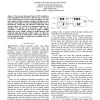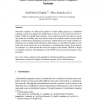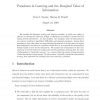454 search results - page 1 / 91 » The Capacity Allocation Paradox |
INFOCOM
2009
IEEE
15 years 8 months ago
2009
IEEE
— The Capacity Allocation Paradox (CAP) destabilizes a stable small-buffer network when a link capacity is increased. CAP is demonstrated in a basic 2x1 network topology. We show...
126
click to vote
COGSCI
2010
15 years 2 months ago
2010
With only two to five slots of visual working memory (VWM), humans are able to quickly solve complex visual problems to near optimal solutions. To explain the paradox between tigh...
124
click to vote
COR
2006
15 years 2 months ago
2006
Numerical examples of a Braess-like paradox in which adding capacity to a distributed computer system may degrade the performance of all users in the system have been reported. Un...
116
click to vote
INFOCOM
2007
IEEE
15 years 8 months ago
2007
IEEE
— By posing the problem of bandwidth allocation as a constrained maximization problem, it is possible to study various features of optimal bandwidth allocation, and hence the cap...
119
click to vote
DA
2010
14 years 10 months ago
2010
We consider the Bayesian ranking and selection problem, in which one wishes to allocate an information collection budget as efficiently as possible to choose the best among severa...



